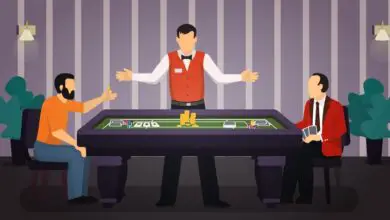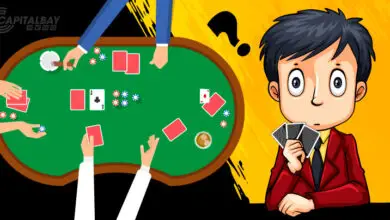How To Play Heads Up Poker? How It Is Different From Traditional Poker?

Heads up poker is played between two players and can be a part of a larger game that is breaking up with only two players remaining at the table. Or it might be two players trying to start a larger game and playing heads up while waiting for other players. This type of game is a necessary component in most sit-and-go (SNG) poker tournaments. It is also played intentionally as in a winner-takes-all tournament for a previously agreed sum of money. In some bigger online poker rooms, heads up poker tournaments can be found in the shoot-out format.
Differences Between Heads Up Poker and Traditional Poker:
Before going into the complexities of heads up poker and the strategies to adopt for being on top of the game, an understanding of how it lines up with other forms of poker is necessary.
Heads up poker games require skill sets that are different from 9 or 10 handed games, primarily because of the differences in how they are set up. It is not merely about strategies but includes a psychological buildup as well.
Structurally speaking, there are only two players in a heads up poker match and this makes you blind in every single hand, forcing you to put money in the pot pre-flop. In a ring game, you are only in the blinds 2/9 or 2/10, depending on whether you are playing at 9 or 10 handed tables.
The relative hand strength is changed too as only two sets of hole cards are dealt out. Your position is very critical as you are either in the best possible position or the worst at the table. In traditional 9 or 10 hand games, the odds are that the best hand will be fairly solid. In a two-hand game, the best hand might be just a weak pair or a high card.
Finally, there is a psychological difference between the two games. Since you will be playing against one player only as opposed to the usual eight or nine, there will be more opportunities to study the mindset of the opponent and evaluate the weaknesses and tendencies.
Heads up games are therefore very stressful and unpredictable. Even if you are holding the major part of the chips, a run of lucky hands can completely turn the tables in your opponent’s favor. Thus, heads up matches often last for hours and the last person on is the one with tons of stamina and grit.
To succeed in heads up, no-limit, hold’em poker, you need to have multi-dimensional skills in math, hand reading, psychology, and face reading. For the bold and the brave this has always been the preferred poker type.
Pre-flop – In no-limit hold’em, position and aggression are very critical. Your objective should not only be to pressurize your opponent to build pots but should also be to develop the chances of putting the onus on him to take tough decisions. When you are out of position you have to play more carefully, defending only with hands that can be played with confidence like pairs and high or suited aces. All poker players need to balance their ranges to seize back the initiative by re-raising frequently against a poker player who is opening with a lot of hands from the button.
On the flop – Remember that on the flop, the strength of a heads up poker player will be wide-ranging. It is thus essential to opt for continuation betting if you raised pre-flop and were called. Your opponent will usually call you in the hope of striking rich on later deals.
On the turn – Turn play is the art of balancing various strategies and is what differentiates a good player from a great one. Poker players generally meet aggression pre-flop and on the flop but aggression on the turn will force the average poker player and hands out of the pots. Players who are out of position tend to get the turn more aggressively than they should. But check-raising against players who are aggressive with a wide range of hands can be a very effective strategy.
The river – This is again an area where hand reading and balancing are important components of heads up poker play. The big players are those that play the river most of the time in the position. When your options are limited to value bet or bluff, you have to adjust your hand ranges throughout to make sure that your strategy of river betting is always balanced well.
You have to always bear in mind that heads up hold’em poker is a combination of logic and psychology, math, and self-discipline. If you cannot adjust to the aggression of your opponent, do what all good poker players do – quit to fight another day.
Heads Up Poker Strategy – Tips to Win the Next Hands
Poker is an excellent chance to showcase your whole range of skills. It is one where you have to play hard and be aggressive while your mental attributes work overtime. Heads up poker strategy requires that you are alert at every moment and in all hands.
One of the primary rules of heads up poker is that you have to be selectively very aggressive while keeping a window open to back down whenever necessary. Unfortunately, to be overly aggressive, the board and the possible hands that an opponent might have are not considered. This gives rise to a situation where you can win plenty of small pots with a lot of aggressive play but can lose out big when you run into an opponent with a strong hand. To avoid this possibility, develop lots of knowledge and concentration about the game and the probable hands and outcomes that can see you going down.
The next critical point is to turn your position in the match to your advantage. If you are the last to play after the flop, you have the advantage of having the most information on which to act about the opponent. Once you can assess the action of your opponent before making a decision or taking any action you will be able to turn a situation to your benefit. The player who has to act first always does so with limited information. This can also work in the reverse when you are in this situation. Be cautious with the information you convey to your opponent. Even when you have a small hand you have to conceal it well so that you can manipulate the other to take the action that you want.
If you can follow these tips and rules for heads up poker, you will have a massive lead in strategy when you are in a game.
How Do You Play Heads Up Poker?
Heads Up Poker is a game where only two people play. In the usual poker games, the betting starts with the player to the left of the one who posted the big blind, and all subsequent rounds of betting begin with the player with the small blind. However, in heads up play, the dealer posts the small blind and the other follows with the big blind. This is to ensure that the play remains fair to all. If the small and the big blind were not reversed, the player betting both before and after the flop would get an advantage since there are only two players.
Where Can I Play Heads Up Poker Online?
Heads Up Poker is not only very profitable but it helps to hone poker skills too, battling it out with a single opponent. Most of the top poker players in the world are heads up specialists. You can fine-tune your poker strategy in online play. There are many sites in the USA where you can log in. Some of the more popular heads up cash games sites include 888 Poker, Party Poker, Bet365, PokerStars, Intertops, and more. You are assured of fast functioning software and generous loyalty programs.
How Do You Deal Up In Texas Hold’em?
Two cards, known as hole cards, are dealt face down in every hand after which players get five community cards to face up in three stages. The first is the flop, the second is the turn and the final card is the river. Players have to work out a betting strategy with the best five-card poker hand from the seven cards. The toppers are the ones playing till the end of all the betting rounds and get all the money.
Why Its Called Heads Up Poker?
Heads up poker is playing against a single opponent and played in tournaments and single-table games. The strategy is to play aggressively. Even if you get a single pair, it can turn out to be a winning hand as the number of players is only two. The range of “playable” hands increases substantially in heads up poker.
Heads up poker permits a high quality of strategic play as it removes a considerable portion of the luck factor.



